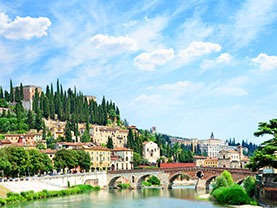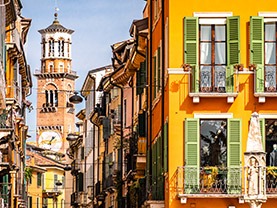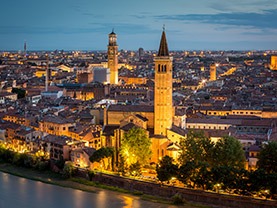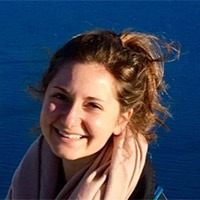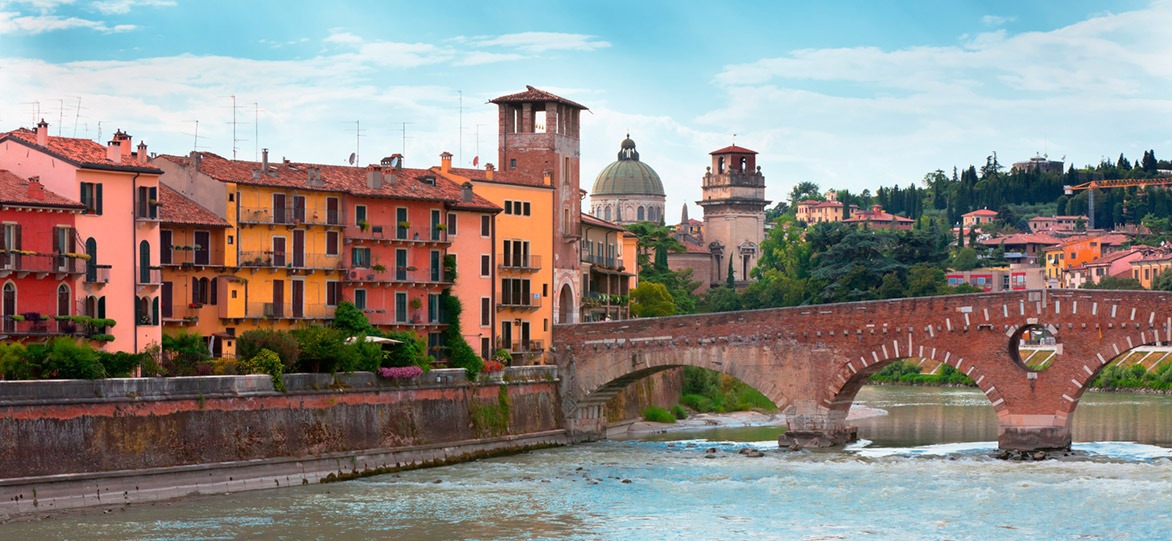
Mediterranean Diet and Health
Verona, Italy
Program Facts
Program Type: UA Faculty-led
Credit Type: UA Direct Credit
Level of Study: Undergraduate
GPA: 2.5
Class Eligibility: Junior , Senior , Sophomore , Freshman who will be Sophomores after the Spring Semester
Language of Instruction: English
Program Open To: UA and Non-UA Students
Coordinator: Sam Cox
Explore Mediterranean Diet and Health
This hands-on Nutritional Sciences course takes place in Verona, Italy, a beautiful and historic northern Italian city. Students will have the opportunity to learn about the approach to food preparation, agriculture and community-based cultural activities characteristic to the Mediterranean region. Excursions include visits to olive oil, pasta, and Parmesan cheese processing plants.
Program Dates: Begins Online May 13 with arrival in Verona on May 18, 2024
Online classes: The Online classes will help prepare you for your experience in Verona prior to departing
Dates in Verona: Arrival May 18 and departure from Verona on June 15, 2024
Please do purchase airfare until instructed by your study abroad coordinator or program lead.
Check out the program video!
This course is designed for students in nutritional sciences, as well as undergraduate students who have a background in the health, biological and biomedical sciences. Students with an interest in the program that may come from different academic backgrounds are also welcome to apply! This unique program begins with one week of coursework at the University of Arizona in Tucson, then students study in Verona, Italy for four weeks. Students not residing in Tucson will have the option of online participation during the first week of classes. Honors credit is also available for Honors students. This will require additional project work during and after the course.
NSC 455 or NSC 455H (Honors) Mediterranean Diet and Health (6 units)
The Mediterranean dietary pattern has a well-established beneficial role in health promotion. Studies reveal the protective role of adherence to this pattern on overall cancer incidence and mortality, prevention of obesity, type II diabetes, and cardiovascular diseases. This course provides an opportunity for students to learn:
1) how dietary patterns and foods associated with the Mediterranean diet modify the risk of chronic diseases including obesity, diabetes and cancer;
2) the impact of foods in the Mediterranean diet on regulation of metabolic pathways;
3) how food industry, food preparation, and food processing characteristic of the Mediterranean diet contribute to the culture and health of people living in the region; and
4) how inclusion of Mediterranean foods in the Western diet can improve quality of life and reduce morbidity/mortality.
Students enrolled in this program will have the opportunity to learn about the approach to food preparation, agriculture, and community-based cultural activities characteristic to the Mediterranean region.
Eligibility:
This course is designed for freshman in good academic standing who will be sophomores at the end of the spring semester, sophomore, junior, and senior students in nutritional sciences, as well as undergraduate students who have a comparable background in the health, biological and biomedical sciences.
Students with an interest in the program that may come from different academic backgrounds are also welcome (i.e. Social & Behavioral Sciences, Nursing, Public Health, Sports and Nutrition, Athletics, Etc.)
Faculty:
Dr. Donato Romagnolo is Professor in the Department of Nutritional Sciences and the Department of Cancer Biology at The University of Arizona. He is a member of the Arizona Cancer Center and the Toxicology Center, The BIO5 Institute for Collaborative Research, and the Southwest Environmental Health Sciences Center at The University of Arizona. He has published book chapters, monographs, and original research in numerous cancer and nutrition scientific journals. In his current position he promotes research that deals with the role of bioactive food components as regulators of expression of genes involved in cancer and inflammation.
Additional participation of faculty and nutrition experts will be included as need to address specific areas of knowledge.
Verona, Italy
This unique program begins with some coursework at the University of Arizona in Tucson, then continues in Verona, Italy for four weeks. Students not residing in Tucson will have the option of online participation during the first week of classes. The city of Verona has been awarded world heritage site status by UNESCO because of its urban structure and architecture. Verona is one of the most-visited cities in Italy, well known as the location of Shakespeare's "Romeo and Juliet".
The architecture of the city of Verona and surrounding areas dates back to ancient work by Romans and others, and it is mentioned in the “Divine Comedy” by Dante Alighieri. The culture of the Veneto region in Northern Italy dates back to thousands of years to when the area was developed under Roman rule and later under Venetian, French, and Austrian influence. Industrial and agricultural activities related to food and nutrition are important to the Mediterranean culture and they dominate many of the economic activities, annual fairs and shows. The area of Verona is most famous for its operas, such as the lyrical season in the Arena, and the amphitheater built by the Romans.
Good to Know:
LGBTQ+ Equality Index rating: Italy rates 64/100 (with 100 being the most equal) on Equaldex’s LGBTQ+ Equality Index.
Global Peace Index rating: Italy ranks 34/163 in the Global Peace Index. The lower the score, the more peaceful the country.
Languages spoken: Italian (official); German, French and Slovene-speaking minorities.
In the U.S., students are responsible for their own housing arrangements. In Verona, students will be housed at Residence All'Adige. All apartments have a private bathroom, fully equipped kitchen, satellite television, air conditioning, and free WiFi. Towels and linens are provided. Laundry is also available. Typically, 2 students will share an apartment. Breakfast is included daily and free access to a gym.
- Students who receive the Pell Grant may qualify for the Gilman Scholarship is a national study abroad scholarship sponsored by the Department of State.
- The Fund For Education Abroad is another national study abroad scholarship that is a great opportunity- if you are eligible, be sure to apply!
- Although it is not exhaustive, our office has put together a list of study abroad scholarships & we have compiled them into a database. Please visit our Scholarship Tracker to view the available scholarships. Do not forget that Scholarship Universe also is another great resource!
Request More Information
Please enter your contact information and a member of the Study Abroad team will contact you.



